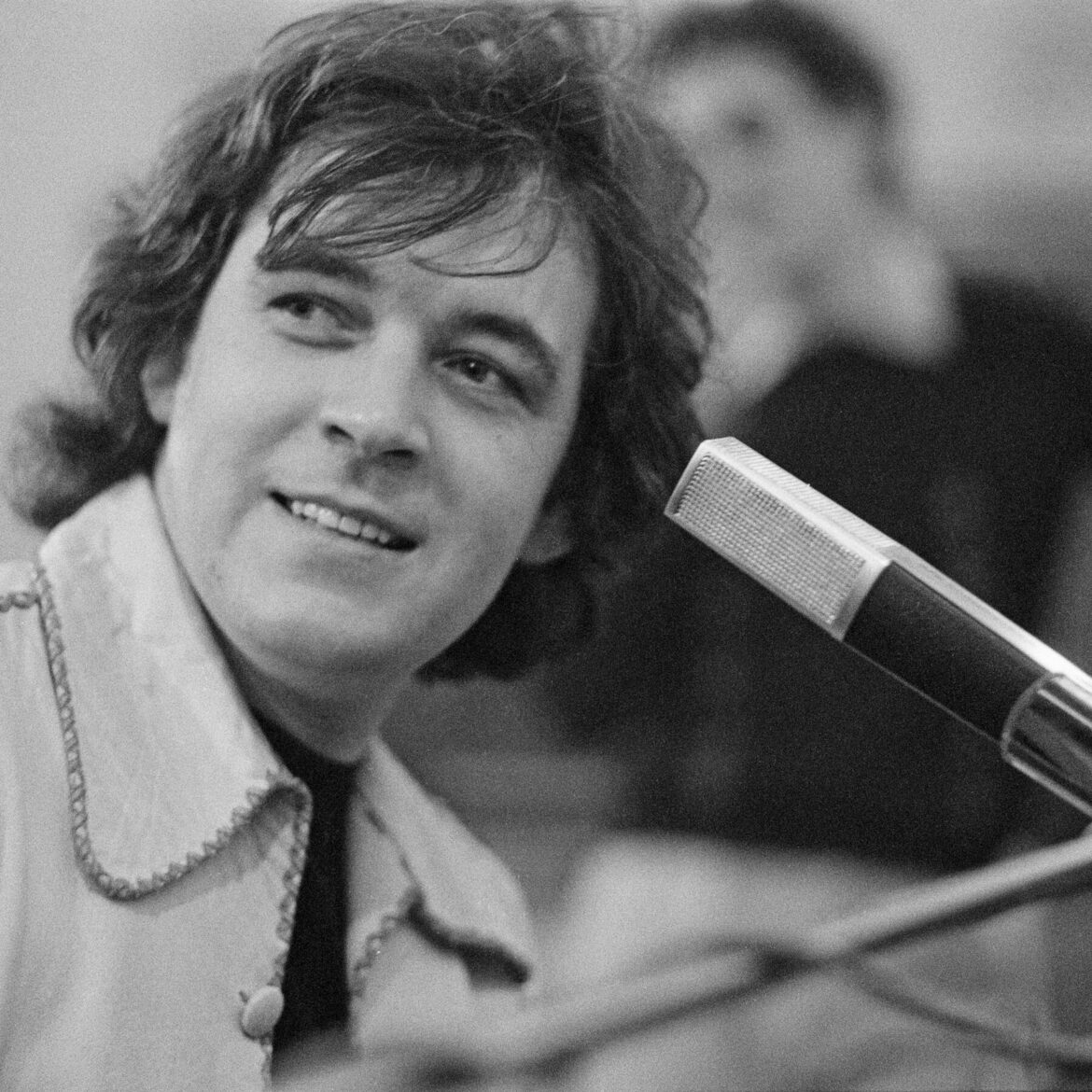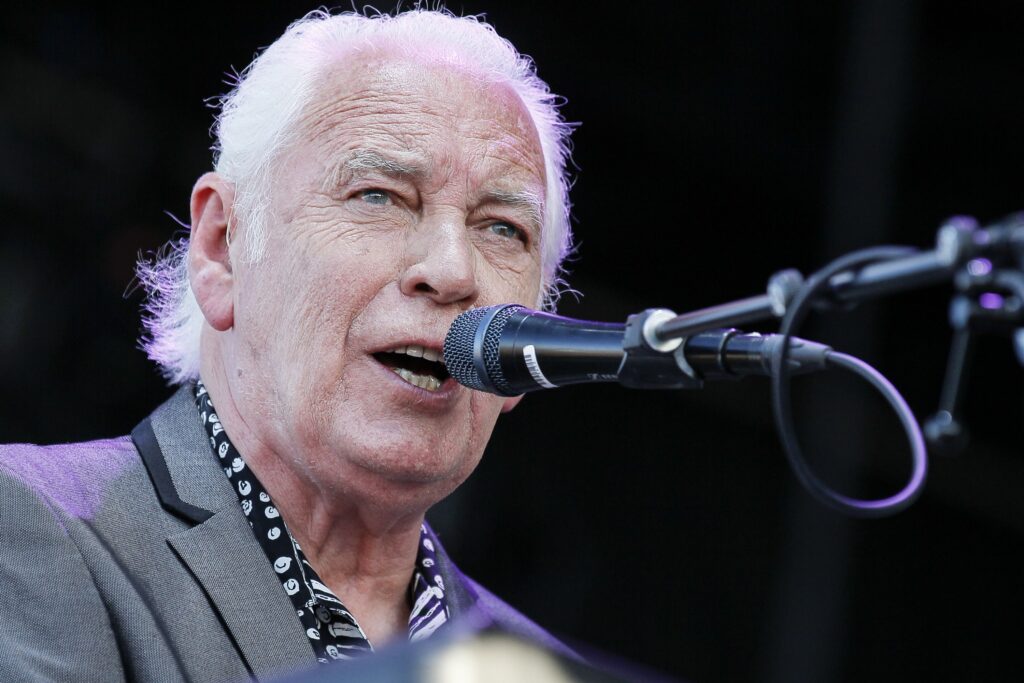
Gary Brooker: The Soulful Voice and Piano Behind Procol Harum (1945-2022)
Gary Brooker was born on May 29, 1945, in Hackney, East London, England. Music played a significant role in his life from an early age. His father, Harry Brooker, was a professional musician, primarily playing pedal steel guitar, a unique instrument in British music. This early exposure to music undoubtedly influenced young Gary, who started learning classical piano. His natural inclination toward music blossomed throughout his childhood, and by his teenage years, Brooker was already a competent pianist and had taken an interest in popular music. He later attended Westcliff High School for Boys in Essex, where he met his future collaborator, Robin Trower.
Brooker’s early love for classical music, particularly composers like Johann Sebastian Bach, would become one of the defining influences in his later work. After completing his formal education, Brooker enrolled in the London College of Music to study classical piano. However, his interest in rock and popular music grew, and by 1962, he formed his first band, The Paramounts, a rhythm and blues group.
The Paramounts initially gained recognition as a cover band, known for their energetic renditions of popular R&B songs, particularly their version of The Coasters’ “Poison Ivy,” which gained them some chart success in 1964. Though The Paramounts disbanded in 1966, the connections Brooker made in the music world during this time set the stage for his career-defining move in the years to come.
The Birth of Procol Harum and “A Whiter Shade of Pale”
Gary Brooker’s next major musical project came in 1967 when he co-founded the band Procol Harum with lyricist Keith Reid. The band’s formation was somewhat accidental, as Brooker and Reid originally intended only to collaborate on songwriting. However, after assembling a group of musicians, including guitarist Robin Trower, Procol Harum was born. The name itself, derived from a misspelling of the Latin phrase “Procul Harum,” meaning “beyond these things,” would later become iconic.
.
.
Procol Harum’s first single, “A Whiter Shade of Pale,” released in May 1967, was an instant and overwhelming success. Brooker’s soulful, melancholic vocals, combined with Matthew Fisher’s haunting organ melody (borrowed from Bach’s “Air on the G String”), created an ethereal, emotionally powerful song. The song’s enigmatic, poetic lyrics, written by Keith Reid, added to its mystique. The track became a symbol of the 1960s psychedelic era, yet it transcended that period to become one of the most beloved songs in rock history. “A Whiter Shade of Pale” reached number one in the UK Singles Chart, number five on the US Billboard Hot 100, and sold millions of copies worldwide.
Gary Brooker’s contribution to the track cannot be overstated. His mournful yet rich voice perfectly conveyed the song’s melancholy atmosphere, while his piano and vocal arrangements showcased a sensitivity that connected deeply with audiences. This blend of classical influences, rock elements, and Brooker’s powerful voice became a hallmark of Procol Harum’s sound.
Despite the massive success of their debut single, Procol Harum was not a one-hit-wonder. They followed up with their self-titled debut album later in 1967, which included other notable tracks such as “Conquistador.” Although “A Whiter Shade of Pale” remained their signature tune, the album marked Procol Harum as a serious and innovative band in the progressive rock scene, characterized by Brooker’s unique fusion of classical music structures with rock and blues.
Procol Harum’s Continued Success and Evolution
While Procol Harum may have never replicated the commercial success of “A Whiter Shade of Pale,” they continued to release critically acclaimed albums throughout the late 1960s and 1970s. Their 1968 album, Shine On Brightly, further developed the band’s progressive rock style, featuring the nearly 18-minute-long suite “In Held ’Twas in I,” one of the earliest examples of rock music adopting a classical composition structure.
As the band’s primary composer and vocalist, Gary Brooker played a central role in shaping the group’s musical direction. He worked closely with Keith Reid, who remained Procol Harum’s exclusive lyricist for much of their career. This collaboration between Brooker and Reid was unique in that Reid did not play any instruments or perform on stage; he solely wrote the lyrics, which Brooker would then set to music. The partnership was highly effective, producing some of the most literate and sophisticated songs in the progressive rock genre.
Procol Harum’s third album, A Salty Dog (1969), is often regarded as one of the band’s finest works. The title track, featuring one of Brooker’s most compelling vocal performances, became another classic, showcasing his ability to convey deep emotion through his voice. The album demonstrated the band’s versatility, moving between orchestral arrangements, bluesy rock, and pastoral ballads. Brooker’s ability to blend these disparate elements into a cohesive sound was a testament to his skill as a songwriter and arranger.
Throughout the 1970s, Procol Harum released a series of well-received albums, including Home (1970), Broken Barricades (1971), and Grand Hotel (1973). These albums, though never reaching the same commercial heights as their debut, further cemented Procol Harum’s reputation as pioneers of progressive rock. Brooker’s piano playing, often grand and orchestral, was a defining feature of the band’s sound during this period, and his voice continued to mature, gaining depth and emotional resonance.
However, internal tensions within the band began to take their toll. Guitarist Robin Trower left the band in 1971 to pursue a solo career, and while Procol Harum continued to produce music, the dynamics within the group were shifting. By 1977, after the release of the album Something Magic, Procol Harum disbanded, and Gary Brooker embarked on a solo career.
Solo Career and Collaborations
Following Procol Harum‘s dissolution, Gary Brooker embarked on a solo career, releasing his first solo album, No More Fear of Flying, in 1979. The album received positive reviews, with critics praising Brooker’s distinctive voice and the personal nature of the material. However, Brooker’s solo career never reached the commercial heights of his work with Procol Harum. His subsequent solo albums, including Lead Me to the Water (1982) and Echoes in the Night (1985), while showcasing his musical talent, did not achieve widespread success.
.

.
During this period, Brooker also became a sought-after session musician and collaborator. He worked with some of the biggest names in rock music, including Eric Clapton, George Harrison, and Ringo Starr. His friendship with Clapton led to his involvement with Clapton’s band in the late 1970s and early 1980s. Brooker contributed to several of Clapton’s albums, including Another Ticket (1981) and Money and Cigarettes (1983). His versatility as a pianist and vocalist made him a valuable collaborator in a variety of musical settings.
Gary Brooker’s contributions extended beyond rock music. He was involved in several charity concerts and events, including performances with The Alan Parsons Project, Wings, and Bill Wyman’s Rhythm Kings. He also made notable appearances at tribute concerts, such as George Harrison’s Concert for George in 2002, where he performed “Old Brown Shoe.”
Procol Harum Reunion and Later Years
In 1991, Procol Harum reunited, and Gary Brooker once again assumed his role as the band’s frontman and primary songwriter. The band released The Prodigal Stranger that year, their first new album in over a decade. While the album did not achieve significant commercial success, it marked the beginning of a new phase for Procol Harum, who continued to tour and release music well into the 21st century.
Gary Brooker remained the heart and soul of Procol Harum during this period. His voice, remarkably well-preserved over the years, continued to resonate with audiences. The band’s later albums, including The Well’s on Fire (2003) and Novum (2017), were well-received by critics and demonstrated that Brooker’s songwriting and performing abilities had lost none of their power.
In 2003, Gary Brooker was awarded an MBE (Member of the Order of the British Empire) for his charitable services. Throughout his career, Brooker was involved in numerous charity projects, and this honor recognized his contributions to music and his philanthropic efforts.
Legacy and Death
Gary Brooker passed away on February 19, 2022, at the age of 76, following a battle with cancer. His death marked the end of an era, as he was one of the last surviving icons of the 1960s British rock scene.
Brooker’s legacy is defined by his unique ability to blend classical music with rock, his unmistakable voice, and his role in creating one of the most iconic songs of all time, “A Whiter Shade of Pale.” Throughout his career, he remained a humble and dedicated musician, never chasing fame but always focusing on the integrity of his art. He left an indelible mark on the world of music, and his work with Procol Harum continues to influence and inspire musicians across generations.
Conclusion
Gary Brooker’s contribution to the world of music is monumental. As the driving force behind Procol Harum, he not only helped shape the sound of progressive rock but also created timeless music that continues to resonate today.
Check out Gary Brooker on Amazon.
Check out Procol Harum on Amazon.
If you found this interesting please share it with friends and family, and why not check out more of our articles on Musicians who Died in 2022.
.

